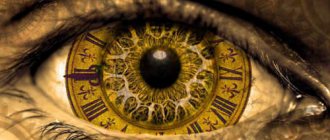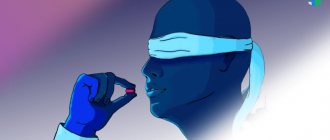Memories and déjà vu: Pixabay Sometimes there is a feeling of repetition of the situation: I have already been here, with these people, in this place. Scientists called the fleeting feeling of recognizing something unfamiliar as déjà vu and are still trying to explain this phenomenon. The features of the phenomenon and its possible causes were explained by psychologists Veronika Nurkova and Anne Cleary.
What is deja vu?
Déjà vu is a short-term state in which current circumstances are perceived as having already happened in the past , but it is not possible to reliably remember when and under what circumstances this happened.
From the sound of the word it is not difficult to guess that it is of French origin. The original phrase “déjà vu” translates as “already seen.” This is a completely appropriate term, since this is how this unusual psychological phenomenon most often manifests itself. But other options are also possible.
Déjà vu can be triggered by a taste or smell, a familiar melody, or tactile sensations. In a completely new situation, there is a strong feeling that this has already happened. Usually the feeling is strong and believable, but a person cannot describe it, so he only screams “Deja vu!”
The original term “Déjà vu” was introduced by the French psychologist Emile Boirac in his 1876 work “The Future of Psychical Sciences.” Before him, another term was used in psychology - “paramnesia”. Literally, this word can be interpreted as “memories beyond memory.” The term introduced by Boirak turned out to be simple, understandable and accurate, so in the future it became generally accepted.
Why does deja vu happen?
There are various hypotheses put forward by scientists from all over the world. It is interesting that not only psychologists, but also physicists joined the study of the phenomenon. The latter are sure that a person feels déjà vu due to a disruption in time . In ordinary life, a person’s consciousness perceives only what is happening at the present moment. During a failure, the times are started simultaneously. Therefore, a person gets the impression that events are repeating themselves.
Not only psychologists, but also physicists joined the study of the phenomenon of déjà vu
- Why does deja vu happen? Pictures from dreams . During rest, people see colorful dreams and experience events. Sometimes a dream cannot be distinguished from reality, so a person laughs, cries or talks in his sleep. Pictures seen during vacation echo real life. The brain analyzes events and selects solutions. Why is there a feeling of déjà vu based on dreams? Perhaps people's experiences are reflected in their dreams in this way. When in life a person encounters an incident that he dreamed about, then déjà vu comes.
- Reincarnation . Parapsychologists do not deny the theory of parallel worlds and a person living several lives. Incidents from past lives fit into the current situation. Reincarnation was recognized in ancient times, Christians and scientists believed in it. Famous personalities have experienced déjà vu when visiting historical sites. Singer Tina Turner saw a past life when she saw the Egyptian pyramids. In it, the celebrity was a friend of the eastern queen. Madonna experienced similar feelings when visiting a palace in China.
- Disruption of the connection between consciousness and the unconscious. The human subconscious is comparable to a large saucepan in which events, emotions, and ideas are cooked, which end up there as a result of the pushing out of consciousness for various reasons. If reality coincides with unconscious images, then déjà vu will appear.
Some individuals have experienced déjà vu when visiting historical places, explaining this as reincarnation - A real memory . The film “The Adventures of Shurik” clearly shows this situation. The main character ends up in the girl’s apartment and does not record the events taking place. Then, visiting the same room, he realizes that he has already been here. There is nothing surprising or secret here, this is how the human brain works. We do not assign meaning to what is happening, but the brain reads the information and sends it to the subconscious. Facts emerge when a person encounters similar events.
- Remember and remember . New events, objects, people force a person to process information. The process is carried out by identifying what is happening. The brain accepts an object according to the rule “I know - I don’t know.” If the process fails, the memory and recording systems are launched simultaneously. The brain perceives what is happening as repeating events, resulting in déjà vu.
Psychologists point out that similar situations happen to people every day. As a result, a reaction to events is formed and experience is accumulated.
When similar situations arise, a person uses the developments of the past, and there is a feeling of recognition of the events taking place.
Causes of deja vu
Despite the prevalence of this phenomenon, there is still no clear understanding of what déjà vu is and how it occurs. However, there are several most popular hypotheses. Let's look at them.
"System failure" in memory
This is the simplest and most logical explanation, especially in the computer era, when everyone knows what a “glitch” or software failure is. Our brain can be thought of as a huge computer with incredible computing capabilities and virtually unlimited memory capacity. We remember everything that happens in our lives, but we remember some things clearly, and others superficially.
A wide variety of information enters long-term memory: visual images, sounds, words and phrases, smells and tastes, tactile sensations. Some memories can be stored for decades without reminding us of themselves. But as soon as, for example, you step your foot into the grass wet from the morning dew, you instantly remember a similar feeling from childhood. And with it comes a whole heap of memories: the singing of birds, the smells of flowers, anxious thoughts about going to school tomorrow...
A similar effect occurs during deja vu. The only difference is that the brain “recognizes” the situation by mistake, therefore, apart from the feeling of “already seen,” no additional memories arise. This is where the “system failure” lies. The brain goes into a special mode in which memories are processed. But since it happened by mistake, I can’t remember anything. The brain realizes that it was mistaken, and the state of déjà vu passes, leaving us bewildered.
Accelerated Perception
In an effort to understand what déjà vu is, an interesting theory was put forward by the American physiologist William Burnham. The bottom line is that perception processes in the brain can accelerate significantly when a person is well rested. Due to this, information of any nature (visual, sound, tactile, taste) can be received and processed twice until the moment of awareness. Having received data in duplicate, the brain comes to the conclusion that one of the duplicates is old memories.
Side effect of “digesting” information
Human memory is quite clearly divided into temporary and permanent. During sleep, a special part of the brain - the hippocampus - processes information received during the day and transfers it from temporary memory to permanent memory. Even completely ignored events can end up in the archive, creating vague and ambiguous images in the memory.
This mode of brain functioning sometimes brings surprises. There are known cases when scientists, who have been struggling for a long time to solve a certain problem, suddenly find the answer in a dream. There is no mysticism in this, it’s just that the brain, systematizing information, finds important connections . Sometimes unnecessary information can get into the archive, and perceiving it as memories, a person experiences a feeling of déjà vu.
Subconscious intuition
Within this version, déjà vu is considered a manifestation of intuition. The subconscious mind calculates options for the development of events “in real time” and sometimes tries to give us a hint, which comes in the form of “déjà vu”. The theory is interesting, but is not popular because it does not explain the emotional intensity of the phenomenon in question.
Layering of similar situations and time displacement
This theory also assumes that the time of events occurring right now is slightly shifted in memory. The brain draws analogies with a certain situation in the past - not similar, but causing similar emotions. However, he does not retrieve it from memory. As a result, a person parallelizes and layers events occurring at the present moment.
What does it mean
Most adult men and women have already encountered circumstances when, upon finding themselves in a new environment, they began to experience a strange feeling that they had already been there before.
Sometimes meeting a stranger makes you think that their face is very familiar. It seems like all this has happened before, but when? To find out the cause and essence of this phenomenon, it is worth finding out the meaning of the word “ déjà vu ”. The translation from French means “already seen.”
The definition in the Large Modern Explanatory Dictionary says that this condition is a mental disorder, which consists of the feeling that everything experienced now is exactly repeated and takes place in the past.
- This phenomenon was first described at the end of the 19th century. Cases of deja vu are found in the works of Jack London and Clifford Simak. Manifestations of recurring circumstances can be observed in the films “Groundhog Day”, “The Adventures of Shurik”.
- It was found that most often the feeling of a familiar situation occurs in people aged 15 to 18 years, as well as from 35 to 40 years. This syndrome is not experienced by children under 7-8 years of age due to unformed consciousness. Doctors, psychologists, physicists and parapsychologists are still trying to figure out what this phenomenon means.
- There is a term for reverse deja vu - jamevu . It means "never seen." A person, being in a familiar environment with familiar people, can feel newness, as if he had never been here and did not know those around him.
The scientific explanation for déjà vu
Human psychology has been actively studied for about three hundred years, but the most important discoveries have appeared in recent decades. Today science has the opportunity to study in detail the processes occurring in the brain using an electroencephalograph, tomograph and other modern equipment. These devices make it possible to identify the relationship between psychological phenomena and specific parts of the brain.
According to research, the frontal lobes are responsible for the perception of future time in humans, and the temporal region is responsible for the past. The specialization of different parts of the brain allows a person to unambiguously perceive and correctly interpret the time frame of events. Some conditions (anxiety, worry about the future) can provoke a failure in the perception of time, as a result of which a person begins to perceive current events as something that happened in the past, as a result of which he experiences déjà vu.
Scientific concepts and explanations of the déjà vu effect
So, why can a person have the feeling that he has already been to this place and seen what is here, although he came here for the first time? Let's start with the fact that the person... could really see it!
Travelers and movie lovers experience déjà vu more often
Travelers and movie lovers experience déjà vu more often because their visual memory is more densely filled with visual images. We have seen the Egyptian pyramids and the sights of European cities countless times in the movies, so when you go on a tourist trip, it’s no wonder you get this very déjà vu effect on the very first excursion. The street layouts of cities in Mediterranean countries are very similar, so when you visit Italy, you will see a lot of similarities in Malta. The architecture of ancient standard structures, for example, amphitheaters, has minor regional differences in different countries. Therefore, having once seen an amphitheater in Greece and then in Cyprus, you may be at a loss as to how you know this place in Cyprus if this is your first time here.
Déjà vu occurs in people with poor memory or an inability to remember the entire situation
Déjà vu occurs in people who have poor memory or an inability to remember a whole situation because they may have seen something similar but cannot remember what it was. At different times, several experiments have been conducted that clearly prove that people often remember details well, but in general they do not remember the situation to which these details relate. However, having recognized a familiar detail or nuance of the situation, they transfer (extrapolate) this nuance or detail to the situation as a whole, believing that they have already “been here and already seen it all.”
Déjà vu may be associated with disorders of the temporal lobe of the brain
Déjà vu may be associated with disturbances in the temporal lobe of the brain, because it is this area of the brain, in tandem with the hippocampus, that is responsible for the formation of long-term memory and the processing of visual and auditory information. In this case, the correlation of the two types of data with long-term memory may be impaired. Moreover, it has been noted that people suffering from temporal lobe epilepsy often experience a déjà vu effect shortly before the next attack. In anticipation of an attack, the electrical activity of the temporal part of the brain increases above normal, and déjà vu becomes a kind of “light version” of a disorder of brain function.
Déjà vu may be associated with hippocampal dysfunction
Déjà vu may be associated with hippocampal dysfunction because the hippocampus is responsible for transferring information from short-term memory to long-term memory. This is a complex physiological process when, when perceiving and remembering new information, it is compared with what is already available in long-term memory deposits. Dissynchronization of processes and failure to compare new information from short-term memory with what has already been seen and stored in long-term memory can lead to the fact that the present is perceived as having happened before. This is how the deja vu effect occurs when the brain confuses the past and the present.
You could see it!
Let's return to where we began to look at the scientific concepts and explanations of the déjà vu effect: you could really see what you see now, and this is not an obsession or hello from a forgotten dream. In this case, the mistake is that you initially consider the environment or situation to be new to you, while you have already been in this environment and such a situation has happened to you. You just didn’t remember it all, because... were focused on something else.
To make it easier and more clear to imagine what we are talking about, let us recall the film “Operation “Y” and other adventures of Shurik” directed by Leonid Gaidai, namely the short story “Obsession”. Here you definitely can’t say that you haven’t seen this film before. According to the plot, the main characters have one note between them and a very short period of time to prepare for the exam. That’s why Shurik doesn’t look around or at the heroine at all.
His attention is focused on the lecture notes and sometimes the details of the interior of the apartment, to which the girl brought him in order to more calmly prepare for the exam, and the pets that live there, come into view. Of course, the hero did not remember the entire situation, so when on the next visit a lot of familiar details were discovered, it seemed like a real obsession.
So sometimes it’s worth asking yourself how accurately you perceive your visit to the place of déjà vu as your first and whether it’s time for you to start training your attention in order to better navigate the space. Now let’s summarize the main reasons for deja vu.
Reasons for deja vu from a scientific point of view:
- You could see it.
- You might have seen this in a movie or other place.
- You may have seen something similar.
- Your temporal lobe of the brain is malfunctioning.
- Your hippocampus is dysfunctional.
In the last two cases, i.e. if there are disturbances in the functioning of the temporal lobe of the brain or the hippocampus, visions of this kind will occur quite often and can last quite a long time, sometimes even the whole day. You definitely won’t miss this symptom, and if you consult a doctor in a timely manner, you can significantly reduce the inconvenience caused by this condition.
Doctors also warn that disturbances in the temporal lobe of the brain and hippocampus can appear in adulthood and become precursors to senile dementia and other cognitive disorders. Therefore, at the first signs of cognitive impairment, measures should be taken to train the intellect and preserve intellectual abilities in old age.
If déjà vu visits you occasionally, lasts a few seconds and does not cause any particular inconvenience, then just say: “Stop, just a moment, you are wonderful!” And let this unprecedented, almost otherworldly feeling last a few more seconds, because then the brain mechanisms responsible for double-checking information will turn on, and the wonderful vision will go away forever. But these are also wonderful moments of your life and another topic for conversation, which, according to various sources, can be supported by 60% to 90% of people.
We sincerely wish that all the events of your life and memories of them were extremely pleasant, bringing joy and a desire to share happiness with loved ones!
We also recommend reading:
- Storytelling
- Sleeper effect
- Pygmalion effect
- The Lachins effect, or the Past Experience Barrier
- Hypnopedia: what is it and does it work?
- The “tip of the tongue” phenomenon
- Brain structure
- The Rosenthal effect or how to wisely lead a team
- 10 Linguistic Concepts Everyone Should Know About
- The effect of misinformation
- Books you shouldn't waste your time on
Keywords: 1Cognitive science, 1Mnemotechnics
Is it normal to experience déjà vu?
This is a common phenomenon that almost everyone experiences, so with rare manifestations it can be considered the norm. But it should be borne in mind that this phenomenon usually manifests itself in states when the brain is tired, as a result of which a short-term failure occurs. If déjà vu occurs too often and causes anxiety, you should consult a psychotherapist.
If you know that the unusual condition is caused by fatigue, you can use such means of preventing déjà vu as:
- good rest (vacation);
- sound sleep at least 7 hours a day;
- playing sports in the fresh air (without increased stress);
- meditation and other relaxation options;
- rest from intellectual activity.
It is recommended to use the listed funds in combination. A good rest will help you get rid of obsessive worries associated with work. Healthy sleep and outdoor exercise are the most important factors for brain health. Meditation and a break from mental activity will help the brain relax and “reboot” if it is too stressed and fixated on work.
Physiological causes of deja vu
Despite the variety of theories, scientists have come to a consensus which parts of the brain are involved when déjà vu occurs . The future is protected by the frontal part, the intermediate zone is responsible for the present, and the past is given to the temporal region. When all parts are working normally, nothing phenomenal happens. But, if a person is worried about the future, worries about upcoming events, makes various plans, then déjà vu may occur. Explained by physiological reasons.
When conducting a conversation, a person reacts to the face of the interlocutor. Depending on the facial expression, a reaction occurs and the brain sends a signal. Physiologists claim that the present time is so short that people only have time to remember events, but do not experience them. Some situations fall under short-term memory, which stores memories for no more than 5 minutes, while others fall under long-term memory.
When experiencing déjà vu, a person usually begins to painfully remember when this event took place.
There are no clear boundaries between the past, future and present. When, in a certain situation, similarities arise between short and long-term memory, the present is perceived by a person as the past. From this point of view, the causes of déjà vu lie in the unique physiology of humans .
How to get rid of the deja vu phenomenon
As we have already understood the nature of the influence of the phenomenon under consideration, it is worth considering whether it is necessary to get rid of it. Experts advise to be wary if the effect is accompanied by any pathological signs, for example:
Overthinking one situation too often
Increased anxiety when experiencing déjà vu
The effect lasts too long
Hallucinations
Physical and mental illness
In cases where you experience these symptoms during déjà vu, it is imperative to see a doctor to diagnose the condition.
Is deja vu an imprint of past lives?
I cannot ignore another interesting version.
Some experts connect deja vu and past lives , as well as ancestral memory (genetic).
Freud's contemporary Carl Jung described sudden memories of “his parallel life as an 18th-century doctor.” He suddenly “remembered” places and phenomena, for example, boots in an illustration in a book.
Tina Turner in Egypt and Madonna in the imperial palace of China recognized landscapes and objects “from their past.”
Whether these evidences of déjà vu are pure, or whether they simply indicate the existence of past lives, we cannot say. However, this is another piece of the puzzle.
Hypnotherapist and regression therapist Dolores Cannon believes that the soul, before incarnation, makes a certain plan for its future life. And moments of déjà vu serve as a reminder of the path you have chosen.
See also: What does immersion into past lives give?
What is regression; what problems can be solved with its help; what abilities and talents are revealed during regression sessions.
Is deja vu a dream or the work of the subconscious?
Some psychologists put forward the version that déjà vu is a manifestation of the work of the subconscious. For example, it calculated the expected development of some ordinary everyday situation. That is, you “lived it” in some way.
Then deja vu simply turns on when this situation arises, and is just a small glimpse of intuition.
However, this does not explain such complete sensory immersion in the detailed process of “memory.” Although, as we will see later, the assumption is not without meaning.
There is also an opinion that the phenomenon of déjà vu is associated with memories from dreams. It was promoted, for example, by such a “bison” as Sigmund Freud.
According to his version, déjà vu occurs as a memory reaction to what is seen in a dream. The dream, in turn, had a real basis from pieces of your early real past.
An indirect confirmation of this can be the fact that some eyewitnesses of déjà vu describe their sensations as “a simultaneous experience of the present moment and memories of a dream in which they lived this moment.”
See also The meaning of dreams from a spiritual point of view
The interpretation of dreams from dream books is outdated. Modern spiritual sources provide fresh information about our dreams and their meaning. There are six main types of dreams...
Is deja vu good or bad?
According to scientific studies of the phenomenon of déjà vu, 60-80% of people have experienced it at least once in their lives. Freud called the effect in question “déjà vu is a trace of forgotten experiences.” And Aristotle called it “a malfunction of the brain.” This raises the question: does the occurrence of this phenomenon have such a bad effect on a person?
No one can give you a definite answer. Scientists are inclined to believe that déjà vu itself is a fairly neutral phenomenon, and the degree and number of its manifestations already determine the nature of the influence on a person. For example, in medicine, in particular psychiatry, it has been recorded that a frequent and obsessive sensation of this effect is associated with the development of human mental and neuralgic disorders. Such disorders are epilepsy, dementia, schizophrenia, and an overly sensitive nervous system. In addition to disorders, experts emphasize the negative impact of déjà vu on people with depression, complexes and other mental wounds.
Interesting tests
Test for knowledge of the capitals of the countries of the world
Guess the names of the capitals of different countries of the world.
Youth slang knowledge test
It will be difficult for the old ones)
Do you remember which cities are depicted on Russian banknotes?
Do you remember well the type of banknotes you use every day?
Erudition test
Appreciate how versatile you are!










